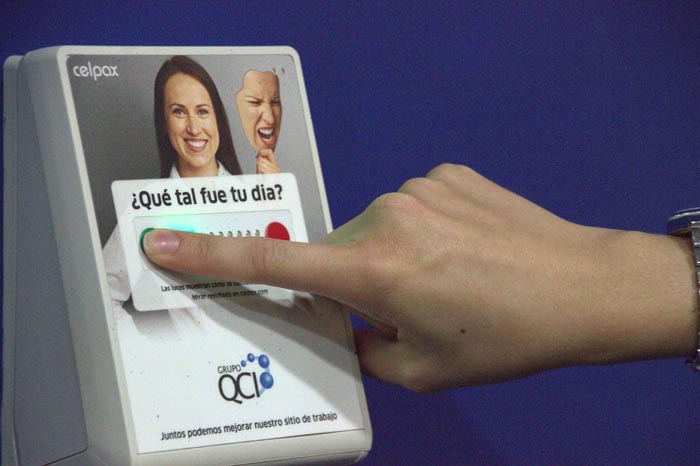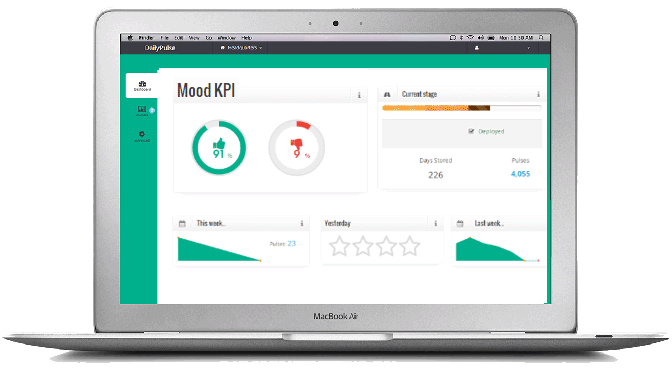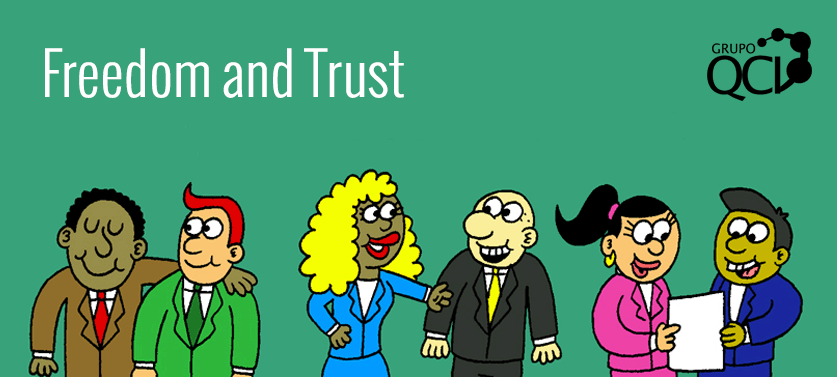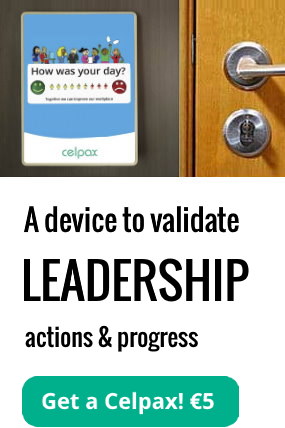Freedom and trust – the key to corporate culture in the QCI Group
Corporate culture examples: Freedom and Trust
Today we’re looking at more corporate culture examples, here’s QCI:
“We have a high trust culture,” says Cristina Pérez, Culture and Organizational Development Coordinator within the QCI group, a business cluster dedicated to the construction industry.
“This means that we work with confidence at all times. We’re not beneath anyone. All of our staff know our goals. We know what needs to be worked on and that creates a corporate culture of responsibility,” she says.
If one person fails to achieve something, it affects everyone else
The successful Guatemalan business meets weekly to discuss their weekly goals.
“We only have one condition here: that you commit to your goals. There’s independence, if one person fails to achieve something it affects everyone else. It has an impact on the whole team. So everyone commits to a ‘punishment’ which could be something like, ‘if I don’t succeed in this, I’m going to run 10 km!  ’.
’.
“We’re a pretty happy company. The following week we review our performance of the previous week and discuss what we will do for the upcoming week.”

The company trusts that the employees will achieve their results:
“This makes us feel happy as nobody asks you to account for all your time. Obviously, there are people who don’t fit in because they are used to being told what to do all the time. There isn’t much hierarchy but there is plenty of communication.”
Leaders more than bosses
The company has long stopped working with fixed hours and schedules:
“Our employees don’t record when they arrive or when they leave the office. This way, each one of them can be working different hours. If you have something personal to do during working hours, just go and do it”, Cristina says.
“We have bosses but they work more as leaders. People come to us from other companies and tell us, ‘other companies don’t work like this! But for us it’s something completely normal. Lots of people tell us that they want to work here :).”
How to maintain a strong corporate culture
“We try to maintain our good organizational culture and once a week we review our values. Last week we reviewed our rules and ethics, for example. This creates a dialogue in which we can all participate and learn new insights by listening to others. This way our corporate culture becomes stronger.”
The company only hires about 5% of applicants and only those who fit in.
In the recruitment process, the company ask the candidates questions to get to know them and to find out if they are really coming to work on something they are passionate about. “We want them to have the same values that we have here”, the HR clarifies.
For example, “if you’re going to work on processes you have to like routine so it doesn’t stress you out. We don’t rely on degrees or titles. We look for people who enjoy providing great customer service! Our employees are doing what they are passionate about, and this is what characterizes us.”
Continuous cultural improvement
“We’ve hung a Celpax device near the door through which employees leave for the day to continue to improve our culture. Our employees press green or red to tell us how their day has been.”
The leadership team always share the results so that all their employees are up to date with how they are feeling in the office.
Once a month they review the data in the board meeting to decide on areas that need improvement.

The Celpax survey kiosk is placed near the office’s exit and measures the workers mood. The questions is “How was your day?” Using the same question you get a baseline. You then see how the KPI changes over time so your team leaders can continuously improve your corporate culture.
Freedom and Trust
“What I like most about working here is the freedom and trust that they give to everyone,” says Cristina in a proud and happy manner.
“The fact that there are no defined working hours is very useful. I have a daughter and a family and I can leave at any time without having to give an explanation. If I am sick I can just work from home.”
“Since we’ve begun the working environment feedback system, I’ve noticed that people have begun to open up more. Some people will look for you and tell you why they pushed a certain button on the Celpax, ‘… I wasn’t happy how X turned out or I couldn’t achieve Y.’”
“Before, many days could have passed without anyone ever knowing. Now, we learn about this stuff.”
What a great day. I feel like pressing the green button!
“There is more awareness now; we evaluate our workday every day,” says Cristina.
“You leave thinking, ‘What a lovely day! I feel like pressing the green button!’ Of course, it’s gratifying to press the button and then see that so many co-workers have left the office pressing the green button as well.”
“Going to work in a culture like ours requires an open mind. I came from the banking sector where I had a boss behind my back every day. Here YOU are responsible. You have to loosen up and learn to work unsupervised.”
It’s good to make mistakes
“It was hard getting used to this mindset. Do I do this or do I do that? Our bosses don’t tell us what to do; they just ask a question, ‘Well, what do you think you should do?’ I wasn’t used to thinking for myself.”
“I notice that those who arrive new to our company need a month to get used to it. The company lets them make their own mistakes. It’s good to make mistakes! This is how you learn. Sometimes it’s hard, but you make your own decisions”, Cristina concludes.

Corporate Culture examples: The Mood KPI at the QCI Group is 91% green. A fantastic result!
Would you like to strengthen your corporate culture?
Get a Celpax device to measure and improve your working environment!
 Hej! I’m Rebecca. Analytics enthusiast by chance and co-owner at Celpax, a for-profit working hard to bring positive change at workplaces worldwide. Say aloha on Twitter and we can talk more corporate culture examples?
Hej! I’m Rebecca. Analytics enthusiast by chance and co-owner at Celpax, a for-profit working hard to bring positive change at workplaces worldwide. Say aloha on Twitter and we can talk more corporate culture examples?
Similar interests
- Non Gamstop Casinos UK
- Slot Sites UK
- New Betting Sites UK
- Casinos Not On Gamstop
- Gambling Sites Not On Gamstop
- Casino Non Aams Sicuri
- UK Online Casinos Not On Gamstop
- Gambling Sites Not On Gamstop
- Sites Not On Gamstop
- Sites Not On Gamstop
- Non Gamstop Casino Sites UK
- Best Online Casino Canada
- UK Casino Not On Gamstop
- Non Gamstop Casinos
- Casinos Not On Gamstop
- Siti Scommesse
- Top Casino Sites UK
- Slots Not On Gamstop
- Casino En Ligne Meilleur Site
- Casinos Not On Gamstop
- Betting Sites UK
- Slots Not On Gamstop
- UK Casino Not On Gamstop
- Migliori Casino Online Non Aams
- Non Gamstop Casino UK
- Lista Casino Online Non Aams
- Meilleur Casino En Ligne
- Best Crypto Casino
- Casino En Ligne
- Casino Online
- Casino En Ligne France
- Paris Sportif Ufc
- Casino Jeux En Ligne
- Meilleur Casino En Ligne
- Bonus Free Spin Senza Deposito
- Casinò Non Aams Con Free Spin Senza Deposito
- Nuovi Casino Non Aams
- Migliori Casino Online
- Crypto Casino
- Casino Non Aams



